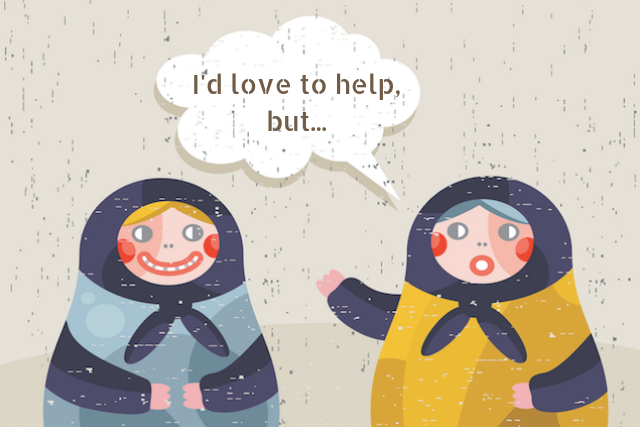
“When you say yes to others, make sure you are not saying no to yourself.” ~Paulo Coelho
There it is again. Another person asks me for help. There’s a sharp pull inside of me to stop what I am doing and give.
And the internal struggle comes up.
I should just say yes and help them. What’s it take to write out a few text lines? An extra phone call? It’s not so bad, I tell myself. You are, after all, a caregiver.
My internal voice is so strong. It has been with me for a long time, this voice.
Then I feel my shoulders tense. I feel my breath begin to shorten. And a light-headed feeling takes over. These are my early warning signs that I am taking on too much.
It has taken me some time to realize that this is what happens when I take on a lot and say yes—and that there is a significant cost to me. It stops me from getting my work done. I am not engaged and present when I am playing with my children. I am short with my husband. It derails my priorities. And it stops me from looking after myself.
If the above sounds familiar, then you can probably relate to being a natural caregiver. Perhaps you are someone who seeks approval from other people. Maybe you are a people pleaser. You might even describe yourself as a “do-er.” You do for others, but sometimes, or maybe always, you forget to just be.
You put the needs of others ahead of your own at the cost of yourself. You thrive on caring for others. You love to give. In fact, you probably hold yourself to high standards, and one of those standards is that you give to others.
Before my first child was born, and even in the first year or so of his life, I continued to give and say yes to others. I was the person that would tell others, “What do you need? I’ll make it happen!” or “Tell me what you have in mind for that day, I’ll be there.” Or if someone needed something, help with anything, I would quickly say yes. I would give up my own thoughts and feelings and needs in hopes of ensuring the other person was happy. To ensure that “we” were happy, and “we” were “good.”
And then it started to hit me in the fall days of long walks with my newborn child—the second child to join our family. With the wind swirling around me, the crunch of the leaves beneath my feet and stroller wheels, and the brightness of the leaf colors, I realized that I was giving so much to others to fill up my self-worth. I was defining who I am, and what I am worth, by what I give to others and what I can do for others.
Give more. Be more present for others. Be there for them. This was my mantra.
It’s not an unfamiliar role. I’m a clinical psychologist, after all. It is what I spend my day doing—caring for others.
My older sister recalls me being this way since my early formative years. She will tell the story of coming to me with her problems, and I would explore ways to solve them or cope. I loved watching others and trying to understand their thoughts and feelings, and their behaviors behind them.
It didn’t take much to find my “calling”—my sharp perception for relationships, how I use my sensitivity and empathy. I find it meaningful to spend my days helping others change, process hard and difficult experiences, and live a life that is filled with meaning and authenticity.
But I’ve noticed the impact of caring for others all the time. It’s a cost. And it was a cost to my own self-worth. I held myself to rigid standards—“If I don’t give then I’m not a good friend.” And yet I spend hours working with clients to help them develop more adaptive ways of viewing themselves. I wasn’t upholding this to myself. Would I think this of my friends? Absolutely not. They are “good,” just as they are, but not me.
I know I am not alone in this challenge. Most of us struggle with communicating our needs and setting healthy boundaries. And many of us need to explore the role of caregiving, what it does for us, and how we can find other ways to build our sense of self.
So, here’s the thing. Gaining insight into this pattern, this behavior, this desire to be in this role, is the first step. I had to understand what it was that I was doing, and what it was providing me. If you are reading this post, you likely identified with the challenge of saying no, and being a caregiver. So here are my eight tips to help you say no.
1. Tune in to when you are feeling overwhelmed.
These signs might be like mine where you experience increased physiological arousal. Or maybe they are emotional (feelings of being frustrated, anxious, hurt), cognitive (holding rigid thoughts; telling yourself you’re not enough), or even changes in your relationship (stop having sex; increased arguing). Identifying your emotional experience will help you identify when you need to change.
2. Acknowledge that you have different thoughts, feelings, and opinions from other people.
You have your own internal experience. And your partner/friend/parent/coworker has their separate internal experience. You are a separate individual from the other person in your relationship. It is not for you to change their internal world, and it is not for them to change your thoughts or feelings, or desires and wishes.
You are responsible, however, for communicating your needs to the other person. If you need to take space for yourself because you have too much on your plate, or perhaps you simply do not want to do a requested task, it is your job to communicate this, with respect, to the other person. More on how to do this in the next step.
3. Start saying no.
You have the right to say no. You do not have the right to be aggressive to someone or to criticize them. “How could you ask me to do that when you know I have so much going on?” That’s critical. You have the right to say no—and you do not have to explain your no.
You can provide empathy for the difficulties that the other person is in. “I see you are having a hard time right now.” You can also express what can happen next time. “Next time, perhaps we can find a way through this together.” And you can express your feelings. “I’m feeling overwhelmed and I am not able to do that.”
Note that sharing feelings starts with “I.” But remember, saying, “I feel like you don’t understand” is not a feeling. Feelings are sad, happy, mad, fearful.
4. If saying no is difficult, try giving yourself the twenty-four-hour rule.
So often we respond with emotion, and this leads us to taking on too much. If saying no in the moment is really hard, let the other person know that you will get back to them in twenty-four hours. Or, if the request comes through an email and it is not urgent, allow yourself a day to reflect on what it is that the request entails and how this would impact you professionally and personally. Remember, we often overestimate what we can get done in a day, or even a year.
5. Maintain your boundary.
If you start to assert yourself and begin to say no, and then you change your mind, others learn to not take your no seriously. This isn’t anyone’s fault. We all do this at times—we all have our own motivation for asking for help.
A boss asking you to stay overtime to help with a project? Or asking you to take on more work? A partner wanting you to complete a task in the home? Helping a friend? Saying no and being a broken record, “Unfortunately I am not able to at this time,” over and over again can help you hold that boundary.
6. Challenge the internal dialogue or bring acceptance to it.
If you hold yourself to a standard that you need to help others, try finding other ways of viewing your no. Does being a good friend mean that you have to always give? This would be what cognitive therapists view as all or nothing thinking. Can you try living in the grey?
Shift perspectives—what would you tell a friend if they were struggling to say no? Or maybe you are using emotional reasoning—you feel bad, so you tell yourself you are bad. What other ways do you show up as a significant other?
Challenge that old dialogue. And if you continue to struggle, perhaps try bringing a stance of acceptance to this old internal dialogue. I bet it has been with you for a long time. And I challenge you to ask others if they have the same dialogue!
7. Give yourself permission to struggle.
This will not change overnight. You will feel guilty. And it will be hard.
The best way to address guilt is to do exactly what it is that you feel guilty about. Feeling guilty for saying no? Say no! If you continue to avoid feeling guilty, guilt will continue to knock on your door. And the way others respond to your new stance of saying no will not change overnight. In fact, I can predict that if you have been in this role for quite some time, the other person will not know what to do at first, and will try to revert back to old patterns.
8. Ask for help.
This is a tough one, especially for someone that always keeps helping others. Often, we are so busy giving help and responding to others that we minimize our needs, and they are not aware that we, too, need help in some way.
Help might come in all forms. Perhaps you start by setting thirty-minutes of you time during the week away from the family. Or you share a task with someone. You could also try letting others know how you are feeling.
Learning to say no has helped me re-focus my priorities. It doesn’t mean that I always say no, but rather I allow myself to be flexible.
There are times when I can give and times when I cannot. Instead of feeling tied to giving as a symbol of self-worth, I shifted my focus to living a life that is connected to what is important to me and to being my authentic self. And when we can be authentic with ourselves and those around us, we feel the most connected between our mind and body.
![]()
About Tracy Dalgleish
Dr. Tracy Dalgleish is a clinical health psychologist working with individuals and couples. She specializes in helping women find balance in the multiple roles in their life. She is a clinical supervisor and gives presentations to healthcare providers and corporations on wellness and mental health. She is a mother of two, a wife, and a novice yogi.
Get in the conversation! Click here to leave a comment on the site.
The post The Art of Saying No: Lessons from a Caregiver appeared first on Tiny Buddha.





